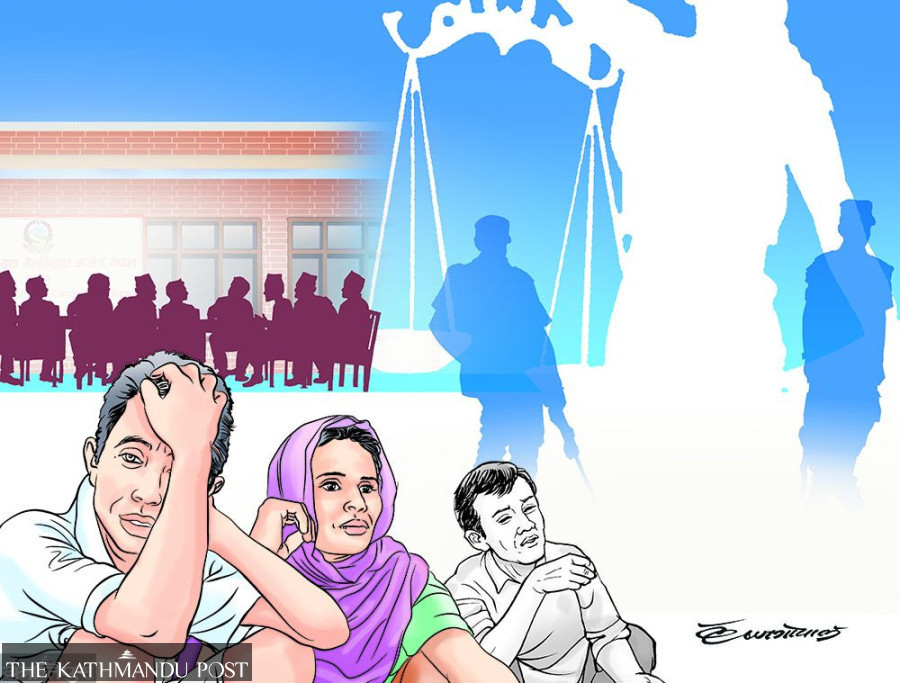
As the government starts preparing a reparation action plan, the insurgency-era victims and human rights defenders have cautioned not to present reparation as a substitute for other pillars of transitional justice.
Eighteen years after the Comprehensive Peace Accord that marked the formal beginning of the peace process, the government has been working on the reparation action plan. Though some relief packages have been provided to a section of victims, there has been no systematic reparation as yet.
“We have started preparing the action plan for reparation. It is in a preliminary phase. We plan to complete it in the upcoming fiscal year,” Rajendra Thapa, a joint secretary at the Prime Minister’s Office, told the Post.
Reparation is an important pillar of transitional justice, along with truth-seeking, prosecution and institutional reforms to ensure non-repetition of violence. While conflict victims and human rights defenders welcome the preparation of the action plan, they have cautioned against projecting reparation as a substitute for other pillars.
“The government must provide reparations to thousands of victims who have awaited justice for years,” said Srijana Shrestha, chairperson of the Conflict Victim Women National Network, at an interaction organised jointly by the International Commission of Jurists (ICJ) and the Advocacy Forum Nepal. “We have seen some attempts being made to portray reparation as the substitute for other instruments of transitional justice. This is objectionable.”
Putting forth their views, stakeholders said all tiers of government should collaborate and cooperate in providing reparations. Currently, some provinces and local governments are providing relief packages to the victims while others have done nothing, which is resulting in discrimination among the victims.
The bill to amend the Enforced Disappearances Enquiry, Truth and Reconciliation Commission Act accepts reparation as victims’ right. However, as the bill recognises only unarmed people as victims, those who were part of the war but faced human rights violations could miss out on reparations. For instance, if an armed fighter or a security force member has been raped or tortured, they would be deprived of reparations.
Expressing her views, Mandira Sharma, senior legal adviser to the ICJ, said there is still no clarity on what reparation is. “There must be uniformity among all the governments in addressing the reparative needs of the victims,” she said. “Meaningful participation of the victims is necessary while developing the reparation framework.”
The ICJ and the Advocacy Forum have been holding interactions with victims and other stakeholders in various provinces to collect their suggestions and support the government in finalising the action plan. Basic principles and guidelines on the right to remedy and reparation adopted by the United Nations General Assembly list four major reparations pillars: restitution, rehabilitation, compensation and satisfaction.
Advocate Raju Prasad Chapagain said the reparative rights of the victims shouldn’t be limited to the transitional justice framework. However, they are also tied to the socio-economic rights enshrined in the Constitution of Nepal. He said the victims of the conflict-related sexual violence (CRSV) and torture have been left out of the government’s relief packages. And accommodating them in the reparation package is important.
Unlike other victims, the CRSV cannot be openly expressed because of the social stigma. Creating an environment to maintain their confidentiality is important so that they can claim reparation, according to Chapagain. Owing to the social stigma, only 314 women registered complaints at the Truth and Reconciliation Commission (while over 63,000 cases have been submitted at the commission.)
In its rulings, the Supreme Court has directed the state to provide reparation to conflict victims and emphasised the importance of reparation in the transitional justice process. It not only recognised monetary compensation but also acknowledged the right to reparation in other forms for victims who suffered gross violations of human rights.
In 2018, the Conflict Victims Common Platform prepared an advocacy paper listing out the reparative needs. Among them were provision of legal aid and free legal services, community-based programmes mitigating the threat and fear of conflict victims, promoting a sense of protection against further human rights abuses, and public acknowledgment and recognition of conflict victims and harms or damages suffered thereby.
Among other demands, it also listed public apologies from those involved in the war, construction of memorials, parks, lawns, roads, schools, museums and gardens at central, provincial, district and local levels as well as naming them after conflict victims, plus marking a national day for dignity and memory of the conflict and conflict victims on the day of the signing of the CPA.
“The needs of the victims evolve with time. Those seeking education some years ago want jobs now,” said Chapagain. “Therefore, proper consultation with the victims before devising the reparative policy will help unearth their actual needs.”

